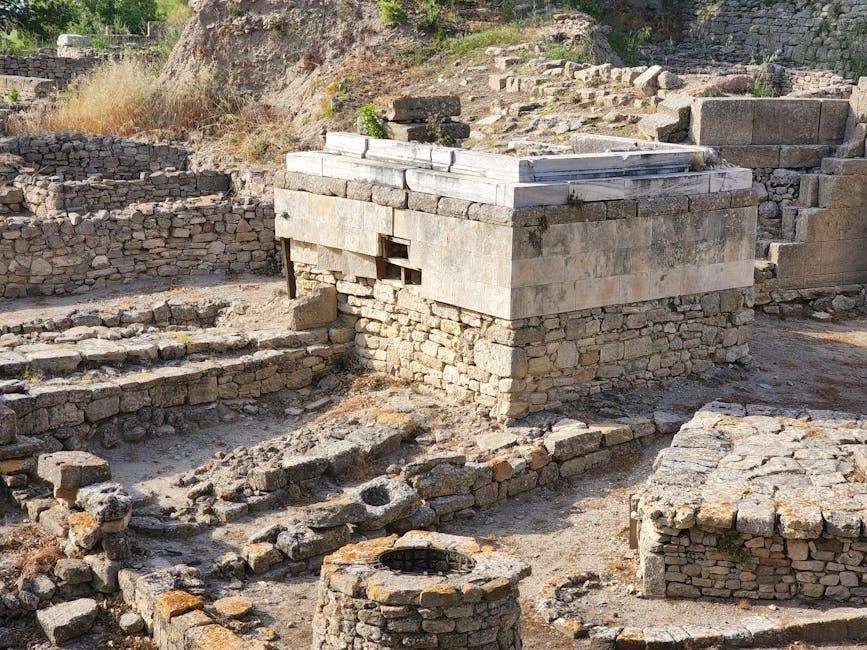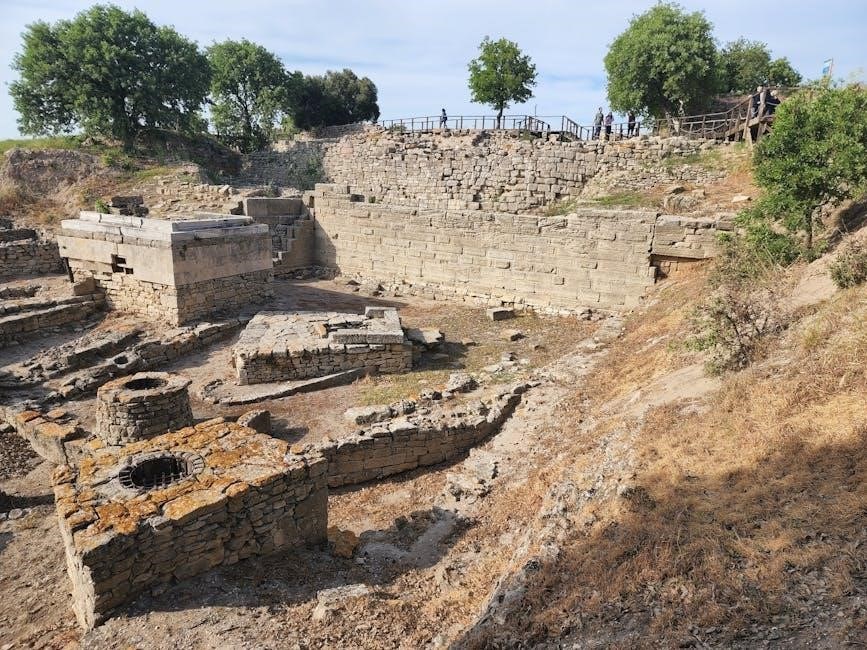The Iliad, an iconic epic poem attributed to Homer, explores human emotion and warfare through the Trojan War. Richmond Lattimore’s 1951 translation is celebrated for its fidelity to the original Greek, blending poetic lyricism with accessibility. His rendition remains a cornerstone of classical literature, offering readers a profound connection to ancient Greece’s cultural heritage. Lattimore’s work is widely available in PDF format, making it a popular choice for scholars and enthusiasts alike.
1.1 Overview of the Iliad
The Iliad is an ancient Greek epic poem attributed to Homer, recounting the events of the Trojan War. Focused on Achilles’ wrath, it explores themes of honor, vengeance, and humanity. Composed in dactylic hexameter, it consists of 15,693 lines, divided into 24 books. Its rich narrative and profound themes have made it a cornerstone of Western literature, with Richmond Lattimore’s translation offering a faithful rendition in English, widely available in PDF format.
1.2 Richmond Lattimore’s Role in Translating the Iliad
Richmond Lattimore’s 1951 translation of the Iliad is renowned for its fidelity to Homer’s original Greek text. His poetic yet accessible prose captures the epic’s emotional depth and linguistic beauty. Lattimore’s work remains a benchmark, balancing scholarly accuracy with readability. His translation, available in PDF, has introduced countless readers to the Iliad’s timeless themes, ensuring its enduring relevance in modern literature.
1.3 Significance of Lattimore’s Translation
Richmond Lattimore’s translation of the Iliad holds immense significance as a bridge between ancient Greek literature and modern readers. His work is celebrated for its poetic fidelity, preserving Homer’s original tone and themes while making them accessible. The translation’s availability in PDF format ensures its widespread reach, maintaining the epic’s relevance in contemporary scholarship and popular culture alike.

Background on Richmond Lattimore
Richmond Lattimore was a renowned translator and scholar, best known for his poetic yet faithful renditions of classical texts. His work on the Iliad is particularly celebrated for its elegance and precision, making ancient Greek literature accessible to modern readers while preserving its original essence.
2.1 Biography of Richmond Lattimore
Richmond Lattimore was born on May 6, 1906, in Paotingfu, China, to American missionary parents. He developed a passion for classical languages early in life, studying Greek and Latin at Dartmouth College and later at Oxford University. Lattimore’s academic career flourished as a translator and professor, with his landmark translation of the Iliad in 1951 cementing his legacy in classical scholarship. His work remains a testament to his dedication to preserving the beauty and depth of ancient Greek literature for modern audiences.
2.2 Lattimore’s Expertise in Classical Literature
Richmond Lattimore was a renowned translator and scholar of classical literature, known for his deep understanding of ancient Greek and Roman texts. His expertise in Homer’s works, particularly the Iliad and Odyssey, was unparalleled, earning him widespread acclaim for his faithful and poetic translations. Lattimore’s ability to capture the essence of classical works made him a pivotal figure in bringing ancient literature to modern audiences.
2.3 His Approach to Translating Ancient Texts
Richmond Lattimore’s translation approach emphasized fidelity to the original text while maintaining poetic grace. He preserved Homer’s dactylic hexameter rhythm and cultural nuances, ensuring the Iliad retained its epic essence. Lattimore’s method balanced literal accuracy with literary flair, making ancient texts accessible without sacrificing their historical and cultural depth.

The Iliad’s Structure and Style
The Iliad, a 15,693-line epic in dactylic hexameter, is structured into 24 books, chronicling the Trojan War and themes of honor and wrath. Lattimore’s translation faithfully preserves this poetic form and cultural essence, ensuring its timeless appeal.
3.1 The Epic Poem’s Composition
The Iliad is a masterfully composed epic, divided into 24 books that recount the events of the Trojan War. Its structure follows a clear narrative arc, focusing on Achilles’ wrath and the subsequent conflicts. Richmond Lattimore’s translation maintains the original’s poetic integrity, preserving the dactylic hexameter rhythm and ensuring the epic’s grandeur resonates in modern English. This composition underscores the poem’s enduring artistic and historical significance.
3.2 Use of Dactylic Hexameter
Dactylic hexameter, a poetic meter with six feet per line, is the hallmark of Homers Iliad. This rhythmic pattern creates a majestic and solemn tone, reflecting the epic nature of the story. Richmond Lattimores translation preserves this meter, adapting it to English while maintaining the original texts poetic essence. His approach ensures the Iliad retains its lyrical and dramatic impact in modern readership.
3.3 Major Themes and Motifs
The Iliad explores themes of honor, pride, fate, and mortality, set against the backdrop of the Trojan War. Motifs such as vengeance, grief, and the human cost of conflict are central. Richmond Lattimores translation captures the poems emotional depth, emphasizing the universal struggles of humanity. These themes resonate across cultures, making the Iliad a timeless exploration of the human condition.

Lattimore’s Translation Technique
Richmond Lattimore’s translation technique emphasizes fidelity to Homer’s original text, employing precise language and poetic sensitivity. His work is renowned for its accuracy and literary elegance.
4.1 Faithfulness to the Original Text
Richmond Lattimore’s translation of the Iliad is distinguished by its unwavering fidelity to Homer’s original Greek text. He meticulously preserved the poetic structure, themes, and cultural nuances, ensuring the essence of the epic poem remained intact. This commitment to accuracy has made his work a benchmark for scholars and readers seeking an authentic experience of Homer’s masterpiece.
4.2 Use of Language and Syntax
Richmond Lattimore’s translation of the Iliad employs a masterful use of language and syntax, balancing poetic lyricism with clarity. He adheres to the original Greek structure, preserving the grandeur and intimacy of Homer’s narrative. Lattimore’s prose maintains the epic’s emotional depth while ensuring accessibility, making his translation both scholarly and engaging for modern readers.
4.3 Handling of Cultural and Historical Context
Lattimore meticulously preserves the cultural and historical essence of the Iliad, avoiding modern reinterpretations. His translation maintains the original Greek context, ensuring the epic’s themes of honor, fate, and warfare resonate authentically. By staying true to Homer’s vision, Lattimore’s work bridges ancient traditions with modern readers, offering a faithful representation of the poem’s historical and cultural significance.

Reception and Reviews of Lattimore’s Iliad
Lattimore’s translation received widespread acclaim for its fidelity and elegance, hailed as the gold standard for Homeric scholarship. Its nuanced rendering of ancient themes resonated deeply with readers.
5.1 Initial Reception in 1951
Richmond Lattimore’s 1951 translation of the Iliad was met with enthusiastic praise for its fidelity to Homer’s original text and poetic elegance. Critics lauded its ability to balance scholarly accuracy with readability, making it accessible to both academics and general readers. The translation quickly became a benchmark for Homeric studies, solidifying its place as a seminal work in classical literature.
5.2 Scholarly Praise and Criticism
Richmond Lattimore’s translation of the Iliad received widespread scholarly acclaim for its fidelity to Homer’s original text and poetic style. Critics praised its nuanced rendering of dactylic hexameter and emotional depth. However, some argued that its literal approach occasionally sacrificed readability for accuracy; Despite these critiques, Lattimore’s work remains a cornerstone of Homeric scholarship, admired for its scholarly precision and literary grace.
5.4 Comparisons with Other Translations
Richmond Lattimore’s translation is often hailed as the gold standard, praised for its fidelity to Homer’s original text. Comparisons with other translations, such as Robert Fitzgerald’s or Robert Fagles’, highlight Lattimore’s unique balance of literal accuracy and poetic flow. While some find his style more archaic, others applaud its faithfulness, making it a benchmark for Homeric scholarship and a lasting influence on subsequent translators like Anthony Verity and Stephen Mitchell.

Availability of the Iliad in PDF Format
The Iliad translated by Richmond Lattimore is widely available in PDF format through sources like the Internet Archive and academic platforms. The University of Chicago Press edition is particularly popular, offering both free and paid access options for digital readers.
6.1 Sources for Downloading Lattimore’s Iliad PDF
Richmond Lattimore’s Iliad in PDF is available through the Internet Archive, University of Chicago Press, and academic platforms like Google Scholar. The Internet Archive offers free downloads, while the University of Chicago Press provides both free and paid access options. Additionally, digital libraries and online bookstores often host the PDF version, ensuring accessibility for scholars and general readers alike.
6.2 Legal and Free Access Options
Richmond Lattimore’s Iliad can be legally accessed for free on the Internet Archive and through academic platforms like Google Scholar. Some versions may require purchase or subscription via University of Chicago Press or JSTOR. Always respect copyright by using authorized sources and consider purchasing copies to support publishers.
6.3 Digital Editions and Their Features
Digital editions of Lattimore’s Iliad are available in formats like PDF, ePub, and MOBI, offering enhanced readability. Many include bookmarks, search functionality, and adjustable fonts. Some editions feature introductions by scholars, annotations, and critical essays, enriching the reader’s understanding. Illustrations by artists like Leonard Baskin are included in select versions, while cross-platform compatibility ensures accessibility on tablets, e-readers, and smartphones.
The Iliad’s Cultural and Historical Impact
The Iliad has profoundly shaped Western literature, influencing countless works and interpretations. Its depiction of the Trojan War and universal themes continues to resonate across cultures and centuries.
7.1 Influence on Western Literature
The Iliad deeply shaped themes of heroism, honor, and conflict, influencing works from Virgil’s Aeneid to Shakespeare’s tragedies. Richmond Lattimore’s translation further popularized these themes, embedding them into Western literary consciousness. Its exploration of human nature and warfare continues to inspire authors, ensuring its lasting impact on literature and cultural narratives across centuries.
7.2 Depictions of the Trojan War
The Trojan War, central to the Iliad, has been depicted in countless adaptations, from ancient pottery to modern films. Richmond Lattimore’s translation captures the epic’s emotional depth, shaping how readers envision the conflict. His precise rendering of battles and characters ensures the story’s vividness, making the Trojan War an enduring symbol of heroism and tragedy in Western cultural imagination.
7.3 Modern Interpretations and Adaptations
Richmond Lattimore’s translation has inspired modern reinterpretations of the Iliad, influencing films, novels, and academic studies. Works like Caroline Alexander’s The War That Killed Achilles (2009) draw on his rendering, ensuring the epic’s relevance. Digital formats, including PDF, have made Lattimore’s version accessible to new generations, fostering fresh engagements with Homer’s timeless narrative in the 21st century.

The Invocation of the Muse in the Iliad
The epic begins with Homer invoking the muse to sing of Achilles’ wrath, as famously rendered in Richmond Lattimore’s translation: “Sing, goddess, the anger of Peleus’ son Achilleus.” This invocation is central to the poem’s structure and thematic depth, setting the tone for the exploration of human emotion and divine influence, now accessible in PDF formats of Lattimore’s work.
8.1 The Opening Lines of the Iliad
The Iliad opens with Homer’s iconic invocation: “Sing, goddess, the anger of Peleus’ son Achilleus, and its devastation.” These lines, masterfully translated by Richmond Lattimore, set the tone for the epic, focusing on Achilles’ wrath and its far-reaching consequences. The famous opening has become synonymous with the poem’s exploration of human emotion and divine influence, now widely accessible in PDF formats of Lattimore’s translation.
8.2 The Role of the Muse in Epic Poetry
In epic poetry, the Muse serves as a divine source of inspiration, providing poets with the knowledge and artistic skill to recount heroic deeds. Homer’s invocation of the Muse in the Iliad highlights her role in guiding the narrative, ensuring its accuracy and emotional depth. This tradition underscores the sacred connection between the poet and the divine in ancient Greek literature.
8.3 Lattimore’s Rendering of the Invocation
Richmond Lattimore’s translation of the Iliad’s invocation captures the poetic essence of Homer’s plea to the Muse. His rendering, “Sing, goddess, the anger of Peleus’ son Achilleus,” balances fidelity to the Greek text with lyrical grace. Lattimore’s precise yet evocative language preserves the invocation’s divine appeal, bridging ancient tradition with modern readability, ensuring its timeless resonance for contemporary audiences.

The Iliad’s Relevance in the 21st Century
The Iliad remains universally relevant, exploring timeless themes of conflict, honor, and human emotion. Its availability in PDF and digital formats ensures accessibility, preserving its enduring appeal for modern readers.
9.1 Timeless Themes in the Iliad
The Iliad explores enduring themes such as honor, pride, and mortality, resonating with readers across millennia. Its examination of human conflict and emotion continues to captivate modern audiences, ensuring its relevance. Richmond Lattimore’s translation captures these universal motifs, making the epic accessible in formats like PDF, allowing contemporary readers to connect with ancient wisdom and emotion.
9.2 Modern Scholarly Perspectives
Modern scholars acclaim Richmond Lattimore’s translation for its fidelity to Homer’s original text, enhancing understanding of the Iliad’s complexities. Its availability in PDF format facilitates academic study and accessibility. Lattimore’s work is praised for preserving the epic’s emotional depth and thematic richness, making it indispensable for contemporary analysis of honor, pride, and human conflict in ancient Greek literature.
9.3 The Poem’s Universal Appeal
The Iliad’s exploration of human emotions—anger, pride, and honor—resonates universally, transcending time and culture. Richmond Lattimore’s translation enhances accessibility, preserving the epic’s emotional depth. Its availability in PDF format ensures modern readers can engage with the timeless themes, making it a cornerstone of global literary heritage, relevant to diverse audiences seeking insights into human nature and conflict.

Comprehensive Analysis of the Iliad
A detailed examination of key passages, character studies, and thematic depth reveals the Iliad’s enduring complexity. Its intricate exploration of human conflict and emotion continues to captivate scholars and readers.
10.1 Detailed Examination of Key Passages
Key passages in the Iliad, such as Achilles’ rage and Hector’s farewell, reveal profound insights into human emotion and conflict. Lattimore’s translation preserves the poetic intensity of these moments, offering readers a vivid understanding of the characters’ motivations and the epic’s timeless themes. The PDF format of his translation ensures accessibility, allowing scholars and readers to delve deeply into the text’s intricacies and emotional depth.
10.2 Character Studies: Achilles, Hector, and Others
Achilles, the fiery warrior, and Hector, the noble defender, are central to the Iliad. Lattimore’s translation captures Achilles’ rage and vulnerability, while Hector’s honor and familial devotion shine through. Other characters, like Odysseus and Priam, add depth, illustrating the human cost of war. The PDF format of Lattimore’s work allows readers to explore these complex figures in vivid detail, enhancing the emotional resonance of the epic.
10;3 Thematic Depth and Complexity
The Iliad explores profound themes of honor, pride, and mortality, with Lattimore’s translation preserving the poetic depth. The struggle between fate and free will, alongside the humanization of warriors, adds complexity. Cultural nuances and the divine-human dynamic are intricately woven, offering readers a rich tapestry of ancient Greek thought. The PDF format ensures these themes remain accessible for modern exploration.

Online Resources and Further Reading
Lattimore’s Iliad PDF is widely available online, with identifiers like ark:/13960/t0011p58w and homer-the-iliad-text-lattimore on platforms like Internet Archive and university repositories, ensuring easy access for readers worldwide.
11.1 Academic Commentaries on Lattimore’s Iliad
Scholarly analyses of Lattimore’s Iliad highlight its fidelity to Homer’s original text and poetic elegance. Critics like Kirk G.S. and Richard P. Martin praise its precision and accessibility, while others explore its cultural and historical nuances. Academic commentaries often emphasize Lattimore’s ability to balance literal translation with lyrical expression, making his work a cornerstone for both scholars and general readers of classical literature.
11.2 Recommended Secondary Literature
Essential secondary literature includes works by Kirk G.S., Stephen Mitchell, and Caroline Alexander, offering insights into Lattimore’s translation. Kirk’s commentary provides a detailed analysis of Homer’s text, while Mitchell’s The War That Killed Achilles explores the Iliad’s themes. Alexander’s feminist perspective in The Iliad adds depth, making these works invaluable for understanding Lattimore’s rendition and its cultural impact.
11.3 Online Communities and Forums
Online platforms like Reddit’s r/Classics and r/Literature host vibrant discussions about Lattimore’s Iliad. Users share insights, recommend readings, and provide links to PDF versions. Forums such as Classical Studies Discord servers also offer spaces for deep dives into Homer’s epic, fostering a collaborative exploration of Lattimore’s translation and its enduring influence on classical scholarship and literature enthusiasts.
Richmond Lattimore’s faithful translation of the Iliad remains a gold standard, ensuring Homer’s epic legacy endures. Its universal themes continue to captivate modern readers, solidifying its timeless relevance.
12.1 Summary of Lattimore’s Contribution
Richmond Lattimore’s translation of the Iliad stands as a landmark in classical literature, offering a faithful yet poetic rendering of Homer’s epic. His work bridges ancient and modern audiences, preserving the original’s emotional depth and linguistic richness. Lattimore’s translation remains widely acclaimed for its accuracy and elegance, ensuring the Iliad’s timeless themes resonate with readers in a accessible, enduring form.
12.2 The Enduring Legacy of the Iliad
The Iliad’s influence spans millennia, shaping literature, art, and culture. Its exploration of human conflict, honor, and mortality continues to resonate universally. Richmond Lattimore’s translation has played a pivotal role in preserving this legacy, making the epic accessible to modern readers. The Iliad’s themes remain relevant, ensuring its enduring impact on global thought and artistic expression, transcending time and cultural boundaries effortlessly.
12.3 Final Thoughts on the Significance of the Work
The Iliad remains a cornerstone of world literature, offering timeless insights into human nature. Richmond Lattimore’s translation bridges ancient and modern worlds, ensuring its relevance. The poem’s exploration of heroism, grief, and destiny continues to captivate, making it a work of enduring significance. Its universal themes and poetic beauty ensure it will remain a vital part of human cultural heritage.

Be First to Comment